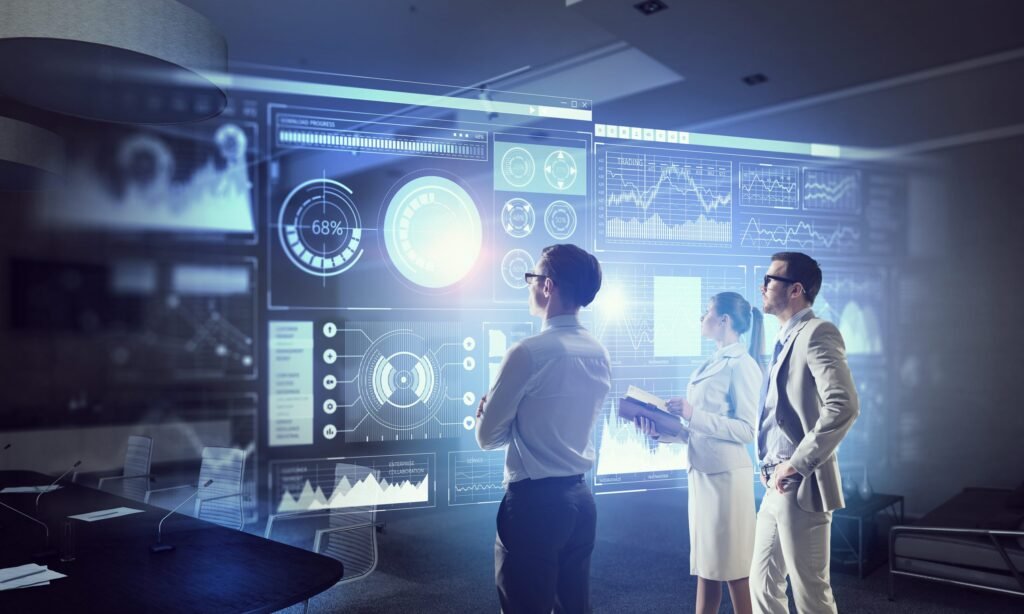Technology in 2025 isn’t just evolving—it’s disrupting and reimagining the world we live in. As we step into an era where artificial intelligence works side by side with humans, and computing breaks the limits of possibility, it’s clear we’re at the tipping point of the next digital revolution. This guide explores 10 game-changing technologies that are set to redefine industries, transform everyday life, and empower a smarter, more efficient world.
Artificial Intelligence and Generative AI
Artificial Intelligence (AI), especially generative AI, is moving beyond automation and now creating human-like content, making decisions, and learning in real time. In 2025, businesses will widely deploy AI to enhance customer support, optimize logistics, and generate marketing content. In daily life, AI will power smart homes, personal assistants, and adaptive learning platforms. The rise of AI ethics, regulation, and explainable AI will also play a crucial role in making these systems transparent and trustworthy.
Quantum Computing Breakthroughs
While still in its infancy, quantum computing in 2025 will see breakthroughs in quantum supremacy, enabling it to solve problems current supercomputers can’t. Industries such as finance, cybersecurity, and drug discovery will benefit from lightning-fast computation and data modeling. This technology could revolutionize cryptography, allowing for unbreakable codes and safer digital transactions—making it a cornerstone of future digital infrastructure.
6G Connectivity and the Hyperconnected World

With 6G networks on the horizon, 2025 will bring ultra-low latency, 1 Tbps speeds, and AI-driven network management. Unlike 5G, 6G will power fully immersive experiences like real-time holograms, fully autonomous vehicles, and hyper-connected cities. This leap will enable the widespread deployment of advanced IoT, making smart cities, factories, and homes not only a reality but a necessity for operational excellence.
Extended Reality XR AR VR Mixed Reality
In 2025, Extended Reality (XR) technologies will go mainstream across industries. From virtual meetings with realistic avatars to AR-powered medical training and immersive online shopping experiences, XR is the next digital frontier. Tech giants are investing heavily in metaverse infrastructure, indicating that virtual reality will become central to how we socialize, work, and entertain ourselves.
Biotech and Precision Medicine
Healthcare is undergoing a revolution with biotech innovations and precision medicine. CRISPR and gene editing will allow treatments tailored to individuals’ genetic profiles. 2025 will likely bring FDA-approved gene therapies for conditions once thought incurable. AI-driven diagnostics and wearable biosensors will allow real-time health monitoring, enabling preventive care over reactive treatment and reshaping the patient experience.
Autonomous Systems and Robotics
From fully autonomous delivery drones to robotic manufacturing assistants, 2025 will be the year intelligent machines truly begin to coexist with humans in the workforce. These systems will operate with enhanced machine vision, contextual decision-making, and human-machine collaboration. While some jobs may be displaced, new roles in robotics oversight, programming, and ethics will emerge—showing that the future workforce is a hybrid one.
Green Tech and Climate Innovation
The global climate crisis has pushed green technologies to the forefront. In 2025, innovations in energy storage, carbon capture, and solar efficiency will lead the way. Smart grids powered by AI will manage electricity distribution more efficiently, while hydrogen fuel and clean batteries become mainstream alternatives. Expect governments and enterprises alike to invest in climate tech not just for sustainability, but for survival.
Brain-Computer Interfaces (BCIs)
Once science fiction, BCIs are becoming a powerful reality in 2025. These devices allow direct communication between the brain and external systems. Whether helping paralyzed individuals control devices or enabling neuro-enhanced productivity, the impact is profound. Tech leaders like Elon Musk’s Neuralink are racing to make BCIs safe and accessible. This human-computer convergence could redefine education, healthcare, and even communication.
Decentralized Finance (DeFi) and Web3
Web3 technologies—fueled by blockchain, smart contracts, and decentralized networks—will take digital ownership to the next level in 2025. From secure identity management to borderless financial services, DeFi platforms are giving users more control over their assets and data. As digital wallets and crypto-based infrastructure grow, so too will user adoption. Expect to see government regulations rise alongside it, shaping a secure and scalable DeFi environment.
Advanced Materials and Nanotech
In 2025, nanotechnology and advanced materials will unlock new frontiers in science and manufacturing. Self-healing surfaces, ultra-strong graphene, and biodegradable plastics will become common. From medical implants to aerospace engineering, these materials will not only perform better but will also reduce environmental impact. The combination of AI with material science will accelerate R&D, shrinking development time from years to months.
Conclusion
The technologies shaping 2025 are no longer theoretical—they’re being tested, deployed, and scaled across industries and lives. For tech enthusiasts, this is a golden age of discovery and disruption. Businesses that embrace these innovations will thrive, while individuals who adapt early will gain a competitive edge in the job market and personal productivity.
To stay ahead, it’s vital to continuously learn, experiment, and remain curious. Whether you’re a developer, entrepreneur, student, or just a curious mind, the next wave of technology is inclusive, intelligent, and inevitably transformative. The future isn’t coming—it’s already here.

Leave a Reply